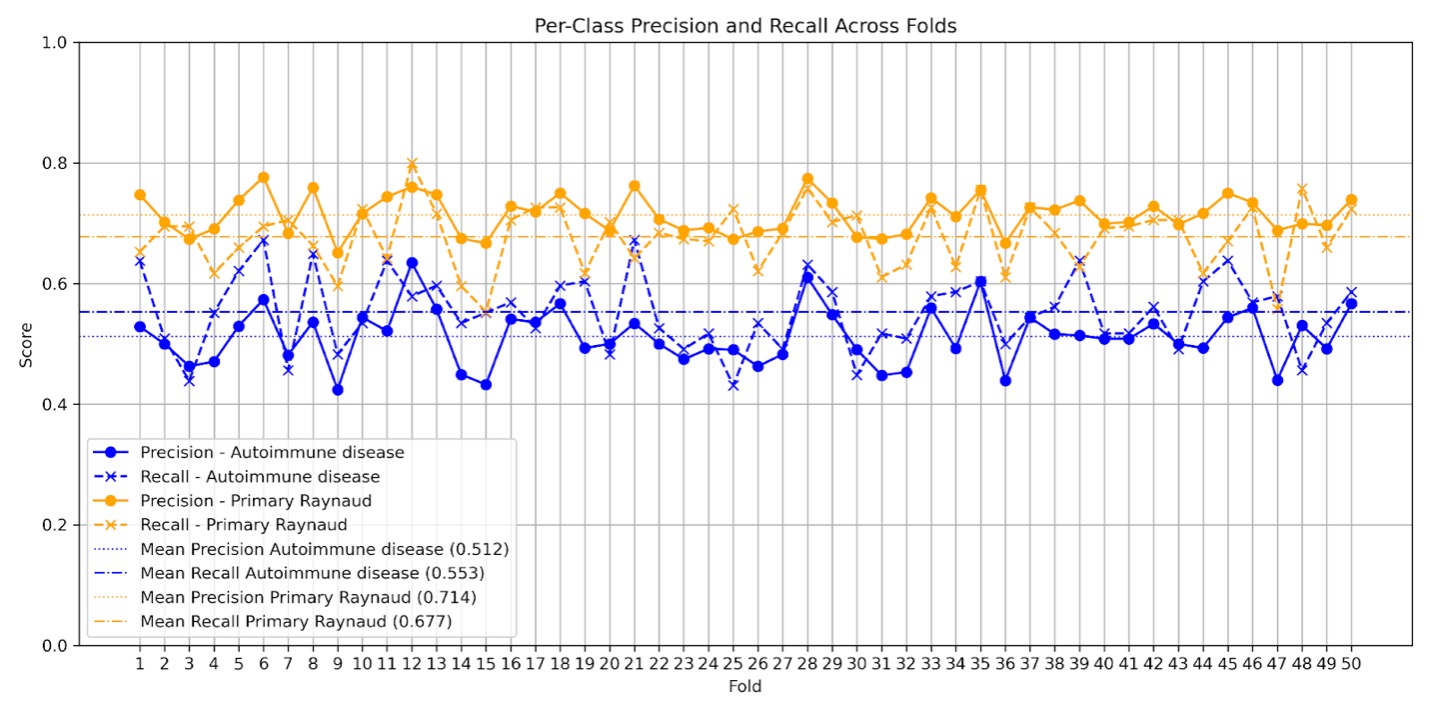Session Information
Session Type: Poster Session C
Session Time: 10:30AM-12:30PM
Background/Purpose: Artificial intelligence (AI) has increasingly been integrated into the analysis of nailfold capillaroscopy (NFC), offering new opportunities to automate image interpretation and enhance diagnostic accuracy in rheumatologic conditions. NFC is a key non-invasive tool for the evaluation of Raynaud’s phenomenon (RP), which may be primary (PRP) or secondary to a connective tissue disease (CTD). Differentiating PRP from early or overlapping autoimmune conditions remains a clinical challenge, especially when NFC findings fall within a non-specific pattern -characterized by tortuosity, abnormal shapes, dilated capillaries, and microhemorrhages. The ability to detect subtle morphological differences using machine learning may support early diagnosis, risk stratification, and clinical decision-making. The aim of this study was to differentiate PRP from various autoimmune conditions that may present with secondary Raynaud’s or overlapping CTD features.
Methods: We developed a machine learning classifier using quantitative image-based features extracted via the Capillary.io platform1-2, Images were uploaded by multiple rheumatology centers across Europe. A 50-fold stratified cross-validation approach was employed to ensure robust performance estimation, with 20% of the cases (n=153) serving as the validation set in each fold.
Results: A total of 761 NFC cases were analyzed. All cases were automatically classified as having a non-specific capillaroscopic pattern by the Capi-Detect algorith. Clinical diagnoses were made independently, based on established criteria and without reference to the capillaroscopic findings. Among the cohort, 473 patients were diagnosed with PRP, while others were diagnosed with: inflammatory myopathies (n=49; including dermatomyositis n=38, polymyositis n=4, antisynthetase syndrome n=4, necrotizing myopathy n=2, overlap syndrome n=1), systemic lupus erythematosus (SLE; n=61), limited systemic sclerosis (lSSc; n=54), Sjögren’s syndrome (n=34), diffuse systemic sclerosis (dSSc; n=26), very early diagnosis of systemic sclerosis (VEDOSS; n=23), antiphospholipid syndrome (APS; n=9), and ANCA-associated vasculitis (n=3).The classifier achieved a mean weighted precision of 0.637, recall of 0.630, and F1-score of 0.632 across all folds. Weighted F1-scores ranged from 0.56 to 0.71, indicating performance variability across different data splits. The majority of misclassifications involved autoimmune cases being labeled as PRP (Figure 1), underscoring the morphological overlap that exists within the non-specific capillaroscopic pattern category.
Conclusion: These findings suggest that subtle but quantifiable differences exist between PRP and autoimmune diseases presenting with non-specific capillaroscopic patterns. Machine learning models may aid in identifying these distinctions and improving diagnostic interpretation. Further studies involving larger, more balanced cohorts are warranted to enhance model sensitivity, generalizability, and overall diagnostic performance.References: 1. Gema M Lledó-Ibáñez et al. Rheumatology, 2025; keaf073.2. Gracia Tello BC et al. Rheumatology (Oxford). 2024; keae197.
 Figure 1: Precision and Recall Across Folds
Figure 1: Precision and Recall Across Folds
To cite this abstract in AMA style:
Maldonado G, Marin Ballve A, Sáez Comet L, Freire Dapena M, Mesa M, Martín Cascón M, Lledó Ibáñez G, Martínez Robles E, Marí-Alfonso B, Guillén del Castillo A, Simeón Aznar C, Gracia Tello B, Ramos ibáñez E, Frech T. Machine Learning-Based Classification of Raynaud’s Phenomenon and Autoimmune Diseases in Indeterminate Capillaroscopic Patterns [abstract]. Arthritis Rheumatol. 2025; 77 (suppl 9). https://acrabstracts.org/abstract/machine-learning-based-classification-of-raynauds-phenomenon-and-autoimmune-diseases-in-indeterminate-capillaroscopic-patterns/. Accessed .« Back to ACR Convergence 2025
ACR Meeting Abstracts - https://acrabstracts.org/abstract/machine-learning-based-classification-of-raynauds-phenomenon-and-autoimmune-diseases-in-indeterminate-capillaroscopic-patterns/
